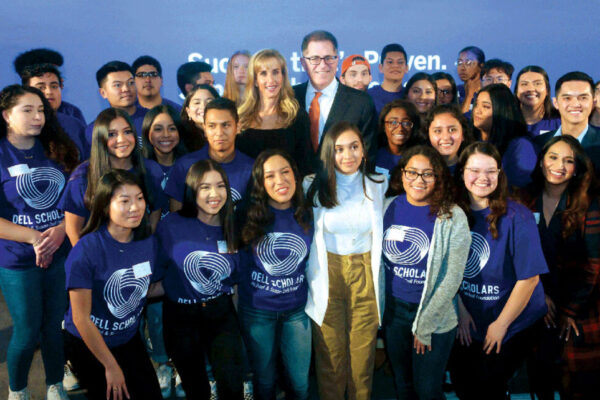Access to The University of Texas at Austin is one thing. Success once here is another. UT has long worked to increase both access and success — including raising its four-year graduation rate from just above 50% to almost 70% during the past decade — but two recent developments have moved UT into national leadership in both categories.
The first came in July of last year, when the UT System Board of Regents approved a historic expansion of student aid, covering the cost of tuition to students from families earning up to $65,000 a year. It did this through the creation of a $160 million endowment to support the Texas Advance Commitment financial aid program.
The reality of that had barely sunk in when, on Jan. 31, a pledge from the Michael & Susan Dell Foundation of $100 million over 10 years to increase student access and success again changed the calculus of attending the state’s flagship university.
This latest development, announced by Michael and Susan Dell, foundation Director Janet Mountain and then UT President Gregory L. Fenves, is an exponential scaling up of a partnership that began in 2004 with the establishment of the Dell Scholars program. Today, there are some 2,500 Dell scholars in colleges and universities across the country, including UT, who each receive a $20,000 scholarship.
But while financial support certainly helps with access, there is a growing recognition of the special challenges low-income students face, as well as a need to provide resources to help them overcome those challenges and graduate on time. For example, many low-income students are in the first generation of their families to attend college, and they can experience not only a heightened sense of homesickness but guilt about leaving family members.
“It would be difficult to overstate the importance of a student’s personal circumstances,” says Sara Levy, program manager for College Preparation & Completion at the Michael & Susan Dell Foundation. “First-generation college students may come from families that are unfamiliar with how to navigate higher education. Other students with the greatest financial need may find that while pursuing a degree, family and economic responsibilities outside the classroom are competing for their time, energy and focus. We know these factors have a huge impact on college persistence, which is why it’s so important to provide a support system to help these students succeed.”
Beginning in fall 2020, the new effort provides all incoming Pell Grant-eligible undergraduate students at UT with ongoing and individualized support, including financial aid advising, tutoring, laptop computers and textbooks. This partnership is known as UT for Me – Powered by Dell Scholars and greatly expands students served to more than 2,000 during the first year. Nationally, the Dell Scholars strategy has yielded a graduation rate four times the average for low-income students. “Through UT for Me, UT Austin and the Michael & Susan Dell Foundation are partnering to help level the playing field for Pell-eligible students,” says Levy.
What single factor helps students succeed? “Having the drive to succeed despite personal obstacles,” says Levy. “Oftentimes, that means knowing how to self-advocate and ask for help. At UT for Me, our services are designed to help students learn to navigate academic challenges, financial literacy and the personal circumstances that can impede their ability to graduate.”
The goal of this new initiative was not to create or even expand a program that would exist alongside the university, but to create one within it — to make it part and parcel of how the university supports all low-income students.
So before the world learned of UT for Me, numerous strands of the campus organization chart needed to band together. Multiple campus partners combined efforts behind the scenes to ensure the gift would have maximum impact on Texas students. Those included Student Success Initiatives and the Office of Scholarships and Financial Aid — both part of the Enrollment Management and Student Success portfolio — Information Technology, University Communications and the Dell Scholars program staff.
The first class of UT for Me students will begin at Texas this fall, and by fall 2023, 8,000 students, or 20% of all UT undergraduates, are expected to be getting this support.
KJ Harris, who previously directed the Office of Student Success within the College of Liberal Arts and later served as an assistant dean in Liberal Arts, was hired as program director for UT for Me, and her team is responsible for all student-facing initiatives. Stated simply, her job is building the students into a community. “We need to find creative and impactful ways to support a cohort of approximately 2,000 students each year. This will take an incredible team and a vast network of support. We have impassioned advocates for student success all across campus, and our leadership understands the value of this work. I am honored to be a part of this team.”
UT’s goal is to build on its success in increasing graduation rates and raise six-year graduation rates for Pell-eligible students to 90% and to eliminate the gap in college graduation rates across income levels. For its part, the university has committed to raising funds to maintain these services after 10 years, with programming fully integrated into UT’s Student Success Initiatives beyond 2030. “UT Austin is already committed to giving every student the opportunity to succeed, regardless of their economic background,” says Harris. “With the progress that’s already been made, UT for Me will complement current programs across the university — from the Texas Advance Commitment and the Student Success Initiatives team to specific college programs that have been exemplary in their support. It’s an incredible opportunity to build on the commitment that spans from the highest levels through every college on campus.”



